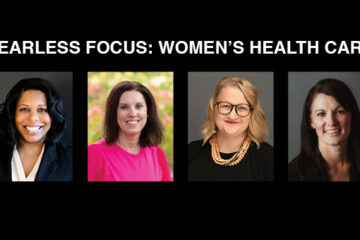Guest essay: The invisible burdens of caregiving for aging loved ones

By Jackie Norris
Editor’s note: When Jackie Norris reached out to me earlier this year with an idea to write about balancing caregiving while working full time, I asked that she take some notes to document the specific challenges she faced for a few weeks. While her perspectives are unique to her, she is one of many women who provide care for older loved ones.
Eldercare needs in the U.S. continue to grow, and the U.S. Census Bureau projects an additional 1.7 million older Americans will need care within the next decade. Researchers found that women accounted for 59% of unpaid caregivers for older family members, performing nearly four hours a day of unpaid care between 2021-2022, according to a report from Wells Fargo.
– Emily Barske Wood, Business Record special projects editor
For a month’s time, I kept a journal so I could try to detail how the burdens of caregiving for older parents weigh on me daily. More and more workers are juggling caregiving along with their day jobs, and this is especially true for women. This is not a complaint list, and I am not looking for sainthood, but it is an opportunity to bring visibility to the life that so many kids with older parents are living right now as they take care of those who once took care of them.
My parents live in Florida and none of my siblings live nearby, but we trade off traveling there on a regular basis. My mom is 86, and my Dad is 90. Both live at their home, but he has Alzheimer’s disease. When we say goodbye, he usually has tears in his eyes because he doesn’t know if he will recognize me the next time he sees me or if there will be a next time. He broke his hip a few years ago, and his downward trajectory has accelerated, the injury forever affecting his ability to walk without a mobility device. After another fall in April, I traveled to help my mom with his care. My mom’s sister, my aunt, was slowly dying nearby at an assisted living facility until her passing in April. My aunt had no children, so we were her caregivers by love and power of attorney.
I live daily feeling like it is all a house of cards – someone or something is going to need even more of my attention, and I don’t know who it will be or when it will be – but it will be. I live daily knowing that I may have to immediately hop on a plane to Florida. I’ve been living in this state for the past four years.
My sisters and I take turns providing caregiving relief in Florida each month, all while trying to do our day jobs remotely. We divide tasks based on our strengths. Kelley, being a nurse, handles health inquiries; Chris manages finances; and I’m the cleanup crew. I’m the get-stuff-done sister. Whatever you need. New nursing home facility? Recliner? I’m your gal. And I’d be lying if a lot of it didn’t include just listening to my mom complain (vent? share?). I want her to complain. It makes me feel useful, being so far away. However, I am a problem solver and I must realize that, at times, all I can do is listen.
My mom is exhausted and starting to decline in health. At 86, she is not living the life she expected. She went from volunteering in her community, playing tennis and cards, to thinking daily about buying Depends, changing sheets, and trying to plan how she can get to the store and back while my dad is sleeping. She rarely leaves the house for more than two hours. She’s torn between caring for him and feeling guilty about leaving him alone.
My parents have been married for over 50 years. I can tell she is embarrassed for him when they are out and about and he doesn’t recognize people. It is very sad for her to see an amazing man, a former city historian, ski instructor and recognized high school teacher for over 30 years be reduced to going to the bathroom in his pants and not recognizing people.
Here is just a sampling of notes from the journal entries I kept in January and February about how caregiving has affected me.
In a late-night call, my aunt was rushed to the hospital for a cardiac emergency. Her recent hospital stay was a stark reminder of how unprepared we are for emergencies. I had to scramble to find her Do Not Resuscitate (DNR) order, and the one I had wasn’t acceptable to the hospital. Thankfully, my sister Kelley was there to help mom navigate through it all.
In the hospital, we were told that my aunt was likely not going to be able to return to her facility. I traveled down to support my mom and prepare for her to be asked to leave. I spent a number of hours researching other options and talking to other facilities. This will be the third time I needed to move her. And while it was not funny, and I do love pets and the special importance they have in people’s lives, my aunt’s cat, Faith, had been quite a challenge. A lot of facilities don’t accept pets, especially nursing homes. I found myself thinking of white lies I might have had to tell if we needed to separate my aunt and her cat.
Heading into a long-awaited vacation in February, I couldn’t shake the worry of something happening to my aunt while I was away, disrupting the break I desperately needed. I just wanted to turn off my phone and email and escape for a bit. I wondered: What would I do? Would I leave the trip? What if they can’t reach me since there is no cell service in a lot of the places we will be?
I went down in late February and supported my aunt. She was not able to leave her bed. She couldn’t get out of that bed. Literally. For the rest of her life, she would be in a bed. “What kind of life is this?” I had wondered. She couldn’t see, she could barely hear. She wanted to die. She prayed for God to take her. What could I say to someone who looked at me and said that? It weighed heavy on my heart. I began to pray for her to die and take her from her misery.
One day, I went in to visit my aunt and her oxygen tubes were off her nose, she had food all over her and hadn’t been changed in over 24 hours. The quality of care in the health care facilities is very inconsistent and not always very good. The staff has changed so much it was hard to keep track. I had created a list for my mom, and it kept changing. The paper that I wrote on had so many scribbles and new numbers. It is hard to say a bad word about the staff – they are overworked and underpaid. And sadly, it came out sometimes in their treatment of my aunt. I am not sure it is better anywhere else. I was scared to complain for fear that it may have an impact on her care.
Today I thought about how lucky my aunt was to have private wealth. While her assisted living facility is far from ideal, in my mom’s eyes, it’s a country club. My aunt’s wealth enabled us to place her in private-pay facilities. I can’t believe the cost of private-pay facilities! My parents do not have that choice. There are no facilities that will accept Medicare within 40 miles of their home. What will I do when we are forced to move my dad to a facility?
My sisters and I do not have a plan. We have talked about it, we have each done a bit of research, but when it happens, we have some serious conversations to have. The easy answer is to move my parents here to Iowa, but honestly, finding a high-quality facility that accepts Medicare in Des Moines is not easy. My siblings and I understand that we may need to supplement this expense. It is another financial worry that hangs heavy on me, but also on the future that my husband has planned for us. And any remaining quality of life my mom has will be yanked out from under her because she will need to move from their house, her friends and the place they have lived for over 30 years. It’s a conversation I dread having.
Our country, state and communities need to take a hard look in the mirror and ask if we are treating older Americans as human beings and providing them with a quality of life that at a minimum, allows them to die with dignity.
Writing this was hard and I kept out a lot. I just really felt the need to say out loud the thoughts and invisible burdens many of us are carrying on our shoulders. I’ve tried to think about how hard this is for the women I employ and even more importantly, for the millions of women who don’t have a family caregiving policy like we do at Horizon Group. The most important thing a person can do is demand action from our state and federal policymakers to support legislation that enhances the quality of life for older Americans and caregivers in the final chapter of life. But today, walk down the hall to your human resources department and learn more about what your company is or can do to support the needs of family caregivers.
Jackie Norris is the president and owner of Horizon Group. She also serves as chair of the Des Moines School Board.



2 Comments
Mary Draayer · May 7, 2024 at 12:30 am
I so understand this life and it is a struggle. We do not have solutions for our elderly. I spend endless hours taking care of my mother while working a full job while trying to be a wife, a mother to grown children, a grandmother to three beautiful grandsons and feeling I am a failure on all.
Donni Popejoy · May 7, 2024 at 4:36 pm
Thank you, Jackie, for sharing this reality with such authenticity. And thank you, Emily, for giving this topic the attention it deserves.
Comments are closed.